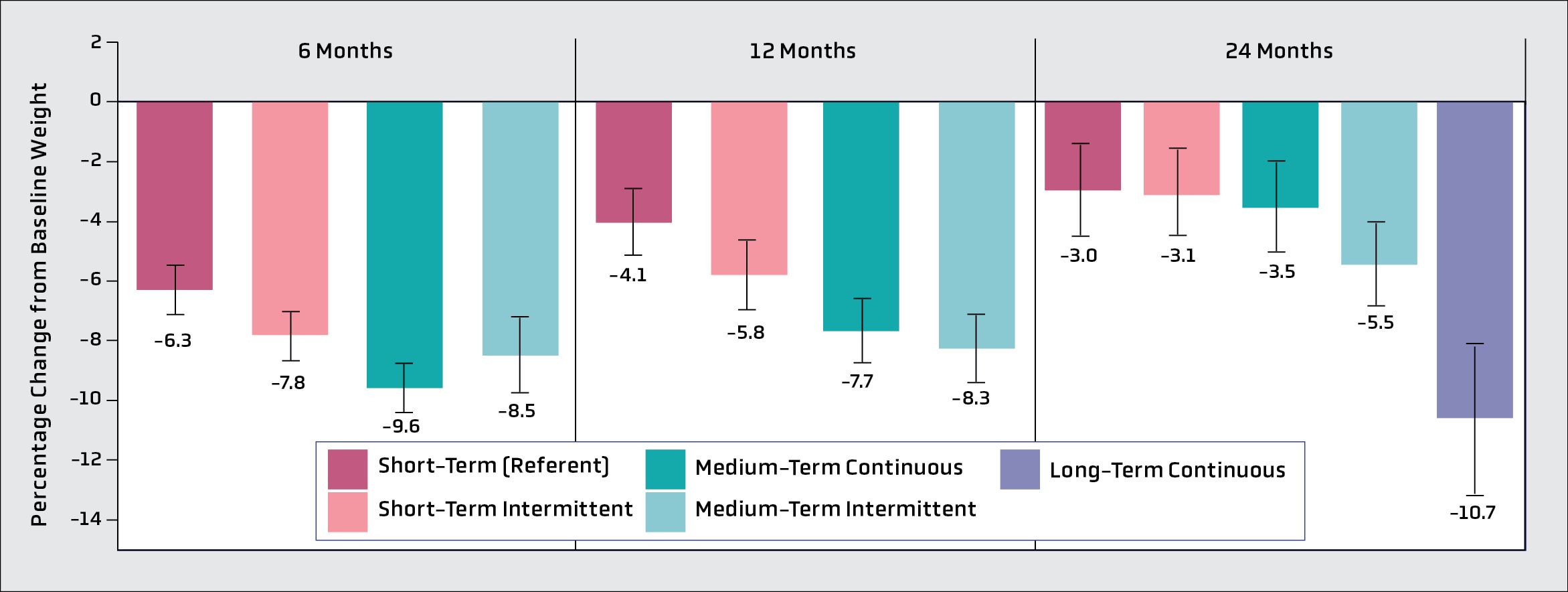Insight into phentermine for sustained weight management
Phentermine is SA’s most popular weight-loss medication. What are its long-term benefits in terms of achieving and maintaining weight loss?

Many anti-obesity medications can enhance response rates and result in meaningful weight loss.
It is generally accepted that treatment of obesity is most effective if it includes some form of lifestyle intervention, which can result in a 5%-10% weight loss over the course of six months. However, nearly a third of patients don't respond to this course of treatment, and it is common for patients to simply regain the weight post-lifestyle intervention.
Research indicates that multiple mechanisms maintain body weight and could partly explain the high rate of weight regain after weight loss through lifestyle intervention. For example, energy expenditure decreases with weight loss, which may contribute to weight regain.
Weight loss leads to changes in the neuroendocrine system that promote weight regain, including; decreased levels of leptin, peptide YY, cholecystokinin, and insulin; and increased levels of ghrelin and pancreatic polypeptide.
One of the prime drivers behind the development of anti-obesity medications is filling the great clinical need for medications that can manage the long-term weight loss journey as part of a holistic approach to weight loss incorporating diet, exercise, behaviour modification and anti-obesity medications.
Many anti-obesity medications can enhance response rates and result in meaningful weight loss. Maintaining weight loss over the long term is often the challenging part. Even with ongoing lifestyle interventions, weight regain can be mitigated but not completely prevented.
WHEN IS LONG-TERM USE INDICATED?
Generally, pharmacotherapy for obesity is an adjunct for managing exogenous obesity, alongside a weight loss plan involving exercise, lifestyle modification and calorie restriction. It is intended for patients with:
- An initial BMI of at least 30 kg/m²
- At least 27 kg/m² with other risk factors like hypertension, diabetes, or hyperlipidaemia.
Long-term use of pharmacotherapy is recommended if weight loss cannot be maintained by any other method at the clinician’s discretion. According to a study by Calderon et al, weight regain is the norm in up to 95% of patients 12 months after discontinuing their medication.
PHENTERMINE
Phentermine, the most widely prescribed weight-loss medicine in South Africa, acts by suppressing appetite. Phentermine is a sympathomimetic amine with significant anorectic activity. Its appetite suppressant effect is generally considered to be exerted through the hypothalamus, but it is not certain that this is the only effect related to weight loss. Phentermine has major effects on the dopaminergic and noradrenergic nervous systems.
Anorectic medicines act mainly on the satiety centre in the hypothalamus where apatite is controlled. Phentermine reduces the perception of hunger by increasing the amount of noradrenaline in the hypothalamus (made up of multiple nuclei including the lateral hypothalamic nucleus, arcuate nucleus, and ventromedial nucleus). Appetite suppression is coordinated by various nuclei within the hypothalamus, notably the lateral hypothalamic nucleus, arcuate nucleus, and ventromedial nucleus.
Local health professional prescriptions of phentermine mirror the medication’s popularity in the United States. In 2012, the FDA approved phentermine/topiramate ER as the first combination drug for long-term obesity management.
WHAT DOES THE RESEARCH SAY?
Lewis, KL, et al, (2019), published a study titled Safety and Effectiveness of Longer-Term Phentermine Use: Clinical Outcomes from an Electronic Health Record Cohort. This study examined the long-term effects of phentermine prescription. It found that prolonged use with phentermine showed enhanced weight loss, considering a two-year follow-up with patients. Additionally, this study showed little/lower cardiovascular risk or mortality within three years of phentermine treatment.
The study used electronic health records from the Patient Outcomes Research to Advance Learning (PORTAL) cohort, encompassing data from eight US health systems. This substantial dataset allowed researchers to explore the effects of phentermine usage on nearly 14 000 individuals.
The study revealed clinically significant weight loss at six months, one year, and two years for those who took phentermine for 112 days to a year (medium-term use) and more than a year (long-term use). Remarkably, those using phentermine for over a year maintained more than 7% of their initial weight loss at the two-year mark.

Estimated percentage weight loss at 6 months and 1 and 2 years after phentermine initiation among responders, from Lewis, KL, et al, 2019.
Estimated percentage weight loss at 6 months and 1 and 2 years after phentermine initiation among responders, from Lewis, KL, et al, 2019.
Individuals who experienced an early response (a loss of at least 3% of their weight within three months) exhibited more sustained long-term weight loss. Contrary to expectations, the study found a reduction in systolic blood pressure after 24 months among long-term phentermine users, possibly due to sustained weight loss.
Phentermine should be initiated under the care of physicians experienced in the treatment of obesity. Patients require medical review after a defined course of treatment. The Lewis, et al, (2019), study sheds some light on phentermine's role in sustained weight loss.
Hendricks et al (2011) conducted a separate analysis of medical records involving 300 patients, a comparison was made between those who received phentermine treatment and those who did not. The study spanned a period of 1 to 104 weeks. The results indicated that the group treated with phentermine experienced more pronounced weight loss than those who received no treatment.
Interestingly, this group did not exhibit elevated systolic or diastolic blood pressure, nor did they display an accelerated heart rate. The expected cardiovascular effects include a pressor response and increase in heart rate and force of contraction. Patients not experiencing these effects meant they tolerated phentermine at that strength.
CONCLUSION
Physiological processes governed by mechanisms that resist weight loss can make it difficult to keep the weight off. Pharmacotherapy is the most practical treatment option for the vast majority of patients. Phentermine is one of the most effective and widely prescribed medications available to South African healthcare providers.

REFERENCES
Bays, HE, et al, 2022. Obesity pillars roundtable: Phentermine – Past, present, and future. Obesity Pillars, Volume 3, September 2022, 100024.
Blomain, ES, et al, 2013. Mechanisms of Weight Regain following Weight Loss. Obes. 2013; 2013: 210524.
Fourie, A, et al, 2023. Potential drug-drug interactions with phentermine among long-term phentermine consumers: A retrospective analysis. SAMJ, August 2023, Vol. 113, No. 8.
Hendricks, EJ, et al, 2011. Blood pressure and heart rate effects, weight loss and maintenance during long-term phentermine pharmacotherapy for obesity. Obesity, 19 (2011), pp. 2351-2360.
Lewis, KL, et al, 2019. Safety and Effectiveness of Longer-Term Phentermine Use: Clinical Outcomes from an Electronic Health Record Cohort. Obesity, Volume 27, Issue 4, April 2019, Pages 591-602.
Truter, I, 2016. Dispensing patterns of prescription-only antiobesity preparations in South Africa. South African Journal of Clinical Nutrition 2016; 29(4):139–144.
Image/Shutterstock.com



